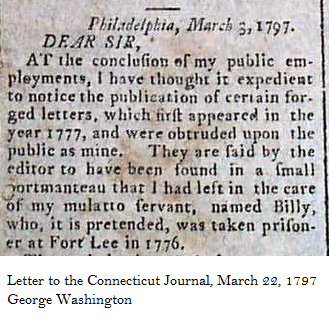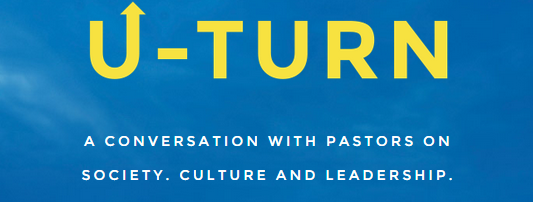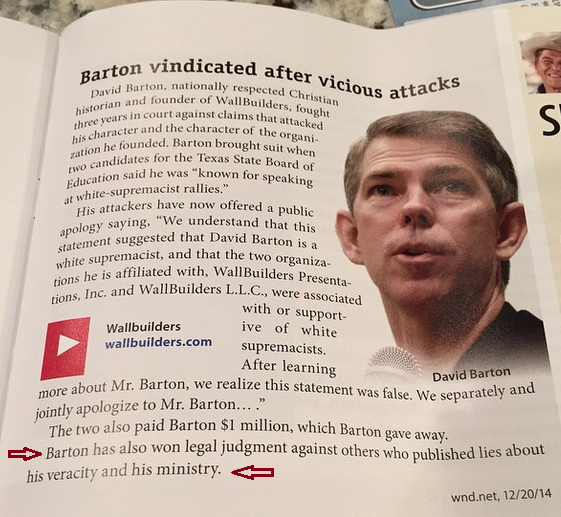In his pulled-from-publication book, The Jefferson Lies, David Barton took the position that Virginia law did not allow Thomas Jefferson to free his slaves. In our book on Jefferson, Getting Jefferson Right, Michael Coulter and I demonstrated that slave owners were allowed to manumit (free) slaves after Virginia lawmakers passed the 1782 Law on Manumission. However, Barton keeps spreading the misinformation.
In February, Barton told Charis Bible College students George Mason was not allowed to free his slaves (at 1:38 into the video). Prior to 1782, slaves could only be freed by the Virginia legislature due to some meritorious service by the slave. Mason died in 1791 so his window of opportunity to free his slaves came near the end of his life. However, despite his strong rhetoric against slavery, he did not manumit his slaves in life or at his death. Barton told the Bible college students Mason didn’t free his slaves “because in the state of Virginia, it was illegal to free your slaves.” Not so.
More recently, he told the pastor of Calvary Chapel Jack Hibbs that Virginia law didn’t allow manumission. It is beyond me why he keeps saying this when it is an easy to look up Virginia’s manumission law as well as the many deeds of manumission which were filed after 1782 (Utah State’s Michael Nicholls is the go to person on this). In prior posts, I have pointed out the amazing story of Robert Carter III who began a process of manumitting more than 450 slaves beginning in 1791.
Barton’s remarks to Hibbs on his show Real Life with Jack Hibbs are below. I provide the video and link to the transcript.
Barton: So just—Let me jump in again on that because one of the blemishes is Washington owned slaves, Jefferson owned slaves, they could not have been good people. It’s interesting that Washington who did own slaves and inherited slaves and Thomas Jefferson inherited most of his slaves when he was fourteen, he got almost two hundred slaves between his inheritance and his and his in-laws. Virginia law made it illegal to free your slaves.
Hibbs: Listen why, yeah.
At 14, Jefferson was not allowed to free his slaves. As an aside, Jefferson did not inherit most of his slaves at 14. This is easily checked by examining Jefferson’s Farm Book. He acquired many of his slave through inheritance from his father-in-law John Wayles. By 1774, Jefferson listed “187 in all.”
Barton asserts that “Virginia law made it illegal to free your slaves.” Before 1782, that was true; after 1782, Virginia allowed manumissions. Jefferson owned slaves until he died (1826) and so it is misleading to say Jefferson could not have freed slaves. In fact, he did. He freed two slaves before he died and then he freed five more in his will. Barton is simply misleading his audience.
In The Jefferson Lies, Barton made the claim that Virginia law did not allow manumission. In a prior post, I pointed out that Barton cited the Virginia law of 1782 in his book but left out the part of the law which allowed slave owners to free slaves by a deed of manumission. Here is what Barton cites from the law in his book:
[T]hose persons who are disposed to emancipate their slaves may be empowered so to do, and…it shall hereafter be lawful for any person, by his or her last will and testament…to emancipate and set free, his or her slaves.
Now, here is the entire relevant section of the 1782 law on manumission:
[T]hose persons who are disposed to emancipate their slaves may be empowered so to do, and the same hath been judged expedient under certain restrictions: Be it therefore enacted, That it shall hereafter be lawful for any person, by his or her last will and testament, or by any other instrument in writing, under his or her hand and seal, attested and proved in the county court by two witnesses, or acknowledged by the party in the court of the county where he or she resides to emancipate and set free, his or her slaves, or any of them, who shall thereupon be entirely and fully discharged from the performance of any contract entered into during servitude, and enjoy as full freedom as if they had been particularly named and freed by this act.
Note the second selection above in bold print. This is the relevant portion of the 1782 law Barton omits. This section allowed living slave owners to release their slaves by filing a deed. Emancipated slaves needed a document which was recorded according to the law as proof of their status. This law allowed slave owners when they were alive to free their slaves, provided slaves were of sound body and older than eighteen if a female and older than 21 if a male, but not above the age of 45. Thus, Jefferson could have freed many of his slaves within the law while he was alive. Not only was Jefferson legally permitted to free his slaves, he actually freed two slaves in the 1790s, Robert (1794) and James (1796) Hemings.
Barton clearly knows what the law on manumission said but chose to remove the part of the law that contradicts his statements to the public. Even though this has been pointed out, he still fails to tell audiences that Virginia law allowed manumission.
While it would have been economically difficult for Jefferson and Mason and Washington to manumit large numbers of human beings, it is simply false to say there was not an opportunity to do it.
The Monticello website explains:
DID JEFFERSON FREE HIS SLAVES?
During his lifetime, Jefferson freed two enslaved men. At his death, Jefferson bequeathed freedom to five men in his will. At least three other slaves were unofficially freed when Beverly Hemings, Harriet Hemings, and James Hemings, son of (Critta Hemings Bowles) to leave Monticello without pursuit.
A single paragraph cannot do justice to the issue of Jefferson’s failure to free more than a handful of his slaves. Some of the possible reasons include: the economic value of his human property (at certain times, his slaves were mortgaged and thus could not be freed or sold); his lifelong view that emancipation had to go hand-in-hand with expatriation of the freed slaves; his paternalistic belief that slaves were incapable of supporting themselves in freedom and his fear they would become burden to society; his belief in gradual measures operating through the legal processes of government; and, after 1806, a state law that required freed slaves to leave Virginia within a year. Jefferson wrote that this law did not “permit” Virginians to free their slaves; he apparently thought that, for an enslaved African American, slavery was preferable to freedom far from one’s home and family.
Jefferson did free slaves. It might have been economically difficult for him to free the rest of them at various times between 1782 and 1806 but Virginia law allowed it. Barton misleads the audience when he says without qualification that the law did not permit it. Jefferson said in a letter that the law did not permit Virginians to free slaves, but he wrote this in 1814, long after the laws had changed to make it difficult to emancipate slaves. Barton then has to account for George Washington’s actions to free his slaves at death in 1799.
They would not let you free your slaves, now there was a period of reprieve for a short time starting in 1782 and so when George Washington died he freed all of his slaves on his death, there was a loophole in the law and the legislature goes “oh my gosh we didn’t see that,” they changed the law, so Jefferson was not even able to free his slaves on his death.
This is a misleading story from The Jefferson Lies. Barton here mentions “a period of reprieve for a short time starting in 1782” and then correctly says that George Washington freed his slaves in his will in 1799. However, the “loophole in the law” is a fiction. As noted above, Jefferson freed five slaves at his death via his will in 1826. There was no loophole. Virginia made it more difficult for freed slaves after 1806 because freed slaves needed to leave the state. For some slaves, this was deterrent because it meant leaving family.
There are many other things Barton told Hibbs and his audience that are inaccurate. For now, I hope it is clear that Virginia law allowed manumission of slaves after 1782 and that many such slaves were freed by owners in Virginia.



